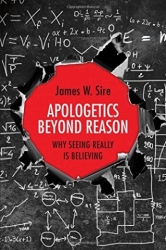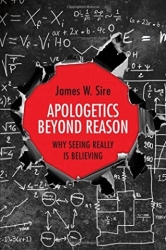Jim Sire has been writing on apologetics themes for a long time, and his work has been widely popular. The former senior editor at Intervarsity Press clearly loves his subject, and it is a pleasure to talk with him today about his work.
Books At a Glance:
Let’s begin on a personal level. Can you tell us something about your background and how you first came to Christ?
Sire:
 I grew up on a ranch and met Jesus when we moved to nearby Butte, Nebraska, where I was soon presented with the gospel in Butte Community Church. I quickly saw myself as needing Christ as Savior. I’ve never really doubted the truth of this basic gospel, but have benefitted greatly by my church affiliation over the years. At the University of Nebraska I became involved with InterVarsity Christian Fellowship, and years later after the military, graduate school at Washington State and the University of Missouri, and, after a few years of teaching at Nebraska Wesleyan, I became editor of InterVarsity Press.
I grew up on a ranch and met Jesus when we moved to nearby Butte, Nebraska, where I was soon presented with the gospel in Butte Community Church. I quickly saw myself as needing Christ as Savior. I’ve never really doubted the truth of this basic gospel, but have benefitted greatly by my church affiliation over the years. At the University of Nebraska I became involved with InterVarsity Christian Fellowship, and years later after the military, graduate school at Washington State and the University of Missouri, and, after a few years of teaching at Nebraska Wesleyan, I became editor of InterVarsity Press.
Books At a Glance:
How did your interest in apologetics begin?
Sire:
As a teenager I asked my first theological question: If God wants all people to believe in him and if he’s all-powerful, why doesn’t he just make them believe? In college I became a somewhat tenacious committed Christian. I was not going to be tricked into losing my faith in Christ, but I was also concerned that Christianity involve a faith that can be reasonably held in the presence of naturalism, the worldview already dominating the academic atmosphere of my university. I studied the Bible seriously and turned easily for help to theology and apologetics books published by InterVarsity Press and Eerdmans. I was the book table chairman for our undergraduate InterVarsity group.
Books At a Glance:
What writers would you say have most influenced your own thinking about apologetics?
Sire:
As might be expected, C. S. Lewis’s Mere Christianity came early and topped the list for some time. But as I began my graduate work, I also turned to Abraham Kuyper, Carl F. H. Henry, Bernard Ramm and Edward John Carnell. When I taught at Nebraska Wesleyan, I added John Montgomery. Then as soon as I began as editor of IVP, I edited most of Francis Schaeffer’s books and introduced the work of Gordon Lewis, Os Guinness, C. Stephen Evans, Douglas Groothuis, Peter Kreeft and Paul Chamberlain.
Books At a Glance:
You have written several books on apologetics over the years. Is there one (perhaps two?) that stands out as your personal favorite for any reason?
Sire:
The Universe Next Door (IVP, 1976, 5th ed., 2009) was my first book to make a mark. It is primarily a work of intellectual history, but its apologetic flavor comes from its attempt to show that the Christian worldview, while no longer dominant in the university, is nonetheless the most viable, the most rational, the most likely to be true. So it not only sets the Christian worldview in its historical context but attempts to give a rational justification for living the Christian intellectual and practical life in the present world where other worldview options vie for acceptance.
The focus of Why Should Anyone Believe Anything at All? (IVP, 1994) is fully apologetic. It’s my “best” shot at giving a rational justification for Christian faith.
Books At a Glance:
What contribution are you hoping to make with your new Apologetics Beyond Reason, your “final” book on apologetics?
Sire:
Good question: Echoes of a Voice (Cascade, 2014) is my first book to focus heavily on Christian experience as a vital feature of apologetics. But in Apologetics Beyond Reason (IVP, 2014) published six months later I pulled together several diverse features of apologetics — personal experience, esp. signals of transcendence, direct perception, imagination (literary and otherwise) and reason. Here’s another way to put this: I present “reasons” that are not just the result of an argument but become features that clarify and give more than rational weight to the case for Christ.
It is indeed my swan song. It’s been in print now for over six months and I can’t think of a better way to capstone my writing career — one secular and some 20 or so books all distinctly Christian.
Books At a Glance:
In this new book you describe your approach to apologetics as “eclectic.” How so? And perhaps you could relate this to your assertion that, even though you favor presuppositionalism, there is no “best way” of doing apologetics.
Sire:
This is another good question, but it’s harder to answer. I will take a circuitous route that demonstrates its eclectic character. I start with a bit of biography (that’s my experience). I intellectually critique Descartes as my epistemological bête noir (that’s philosophy); I respond with a presupposition that God is the beginning of all being and all knowledge (that’s ontological theology). Then I argue from the presupposition of God as the Creator of nature (“creation”).This gives me the foundation for an argument from God as well an argument from everything. Of course, this argument is a bit more complicated than my simple summary. What follows next is somewhat unusual (not unique — Lewis and Chesterton do it). I formulate a definition of literature and show how that understanding points to literature’s vivid depiction of reality — reality as both truly and as falsely conceived. What follows next is a story illustrating how an experience of art — literature and painting — can lead to a perception of the central truth of the Christian faith. Finally, I turn to what I’ve long thought as the best single apologetic of all — Jesus himself, his character, his life, his death and resurrection and his teaching.
If that’s not eclectic, I don’t know what is. Yet its very eclecticism is its strength.
Books At a Glance:
You summarize your thesis with the proposition, “There is everything; therefore, there is God. Either you see this or you don’t.” Could you explain this for us? And while we’re at it, what is the significance of your title, Apologetics Beyond Reason?
Sire:
“There is everything; therefore there is a God” is another way of rendering Paul’s profound declaration in Romans 1:18b-19: “What may be known about God is plain to them [everyone, including the wicked] because God has made it plain to them. For since the creation of the world, God’s invisible qualities — his eternal power and divine nature — have been clearly seen, being understood from what has been made, so that men are without excuse.”
For most of my life, I have understood Paul to say that God is the end of an argument from the existence of nature. Following Alvin Plantinga, I now think that Paul, rather than framing an argument, is identifying an immediate perception. All human beings have the innate capacity, a sensus divinitatus, to directly perceive the presence of God. They have this sense of God’s presence, but when they suppress the knowledge, they become worse than merely ignorant; they take on the characteristics of evil.
Of course, others may not and do not, read Paul in this way. Perhaps they are correct. But it makes sense to me. My case for this interpretation is given in much fuller form in Echoes of a Voice.
What I’ve just said should explain the title: Here is an “apologetics” that does not rely solely on an argument or series of arguments. Here one does not proceed from perception through reason to conclusion. For example: A cosmos exists (direct perception). The cosmos changes (another perception). All change must be prompted by a cause that is not a part of that which is caused (rational presupposition). This cause is what we call God. Bingo. This is, of course, a crude parallel to Aquinas’s argument toward an unmoved mover. My point is that the perception of a transcendent presence behind the immediate perception will for most people be more likely than a deductive argument requiring premises leading to a conclusion.
Books At a Glance:
Explain for us the difference between an argument to God and an argument from God.
Sire:
I think I’ve just done this in my answer above. But let me go a bit further. If we can and do perceive God, whether by argument or direct perception, we can now begin our arguments with God — i.e., the notion that God exists. If God exists, how does his existence relate to the existence of his creation? Theology then speaks of transcendence and immanence, and this knowledge undergirds our ability to know. Scripture, for example, reveals that we are made in the image of God. Philosophical musings not necessarily based on Scripture then plumb issues of what is consistent with the character of God whom we directly perceive. What we know about God results from a combination of direct perception and human reason.
Books At a Glance:
You argue that human reason cannot be genuinely autonomous and that the Enlightenment was “a great Darkening.” Can you explain this for us briefly?
Sire:
Enlightenment intellectuals rejected the need and relevance of divine revelation. The human mind, they said, is all that is needed to discover truth about reality. When they abandoned God, they lost a foundation for trusting the results of their minds. Why should a machine (the brain) produced from previously non-conscious, non-intentional matter be reliable as it becomes self-conscious and able to think? The situation was not improved philosophically by the Darwinian notion that the brain is only the result of a mechanism evolving by means of the survival of the fittest? By the end of the nineteenth century, Nietzsche announced the death of God and followed by showing that the reliability of human reason to access the truth of reality was also dead. The following two centuries are still struggling to give a reasonable answer to this desperately serious issue. The hope of the Enlightenment became the despair of the modern and postmodern world.
As I said above, every argument begins with at least one premise that, strictly speaking, is not able to be proved by the arguer. A Christian argument should assume the premise that God exists as transcendent creator of an intended intelligible cosmos. To wit, God himself is the foundation of all valid arguments for his existence or the existence of anything else. This may appear circular. There is a God because there is a God. But such an assumption (or presupposition) is necessary. Nothing less than this accounts for confidence that our mind can give us true knowledge.
And so as I argue in detail in Apologetics Beyond Reason:
There is everything.
Therefore there is a God.
Either you see this or you don’t.
Indeed, this syllogism looks absurd. It doesn’t seem to embody reason at all. Surely, it’s a leap of faith. No, not a leap of faith, but a leap beyond reason to sudden, intuitive direct perception of reality. Seeing really is believing. Let us say to the world, “Come and see.”

